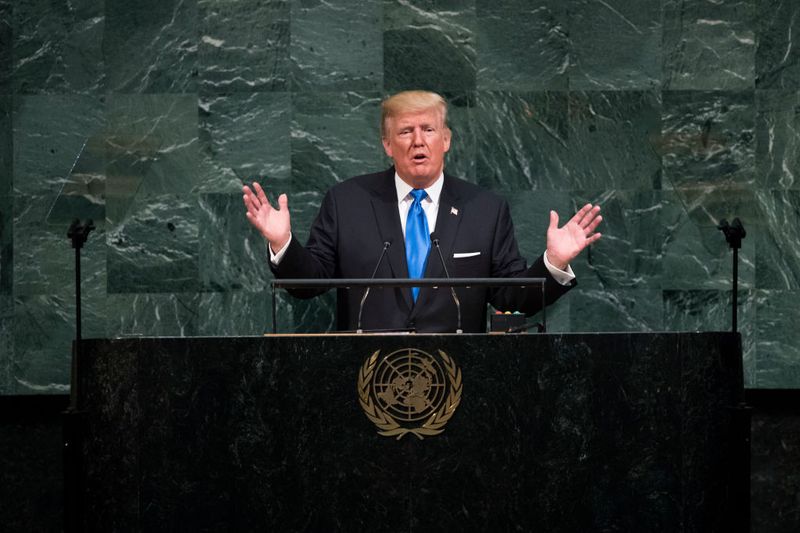If you want to get a sense of the enduring power of American exceptionalism, watch President Donald Trump’s address Tuesday to the United Nations General Assembly. Here we got a clear message from the candidate whose foreign policy platform was “America first”: He implored the regimes of weaker rogues to clean up their acts, or else.
The president threatened total destruction for North Korea. Its leader, whom Trump called “rocket man,” is on a “suicide mission for himself and for his regime,” Trump warned. “The United States is ready, willing and able, but hopefully this will not be necessary.”
Iran? The deal his predecessor struck to temporarily limit the nuclear program was an “embarrassment to the United States.” But it doesn’t end there.
Trump says that sooner or later revolution is coming to the Mullahs. He asserted the whole world “understands that the good people of Iran want change, and, other than the vast military power of the United States, that Iran’s people are what their leaders fear the most.”
This was just the warmup. Trump went full neocon for Venezuela. Its leader, Nicolas Maduro, is a dictator “stealing power from his own people.”
Whereas Trump was vague about what his plan was for North Korea and Iran, for Venezuela he came very close to calling for regime change. “The United States has taken important steps to hold the regime accountable,” Trump said. “We are prepared to take further action if the government of Venezuela persists on its path to impose authoritarian rule on the Venezuelan people.”
For a moment, I closed my eyes and thought I was listening to a Weekly Standard editorial meeting.
To be sure, this is not quite a return to the days of George W. Bush, who in 2005 made it briefly US policy to seek democratic transformation for friend and foe alike. Trump offered no critiques for the illiberal systems and strongmen that rule Russia or China. He briefly called out threats to the sovereignty of Ukraine and the freedom of navigation in the South China Sea, without mentioning Russia and China by name.
And yet Trump, who ran in part against the folly of neoconservative nation-building, is also not quite ready to give up the power of America’s values in determining its interests. He calls his approach “principled realism.” And on the surface it nods to the respect traditional foreign policy realists pay to national interests. But there is also a paradox. Trump still wants nation states to serve the interests of their people.
Consider this line from the speech: “We do not expect diverse countries to share the same cultures, traditions or even systems of government, but we do expect all nations to uphold these two core sovereign duties, to respect the interests of their own people and the rights of every other sovereign nation.”
On the one hand, Trump is correct. States with governments that respect their own people are almost always less bellicose than states ruled by authoritarians. Dictators like Vladimir Putin often must start foreign wars to distract from their own corruption at home.
At the same time, Trump’s formulation leaves a lot of wiggle room for what traditional foreign policy realists deride as military adventurism. After all, who determines when a nation is respecting the interests of its people? Trump certainly isn’t saying that is for the UN to decide. He spent a good portion of his speech threatening unilateral action against Iran, North Korea and Venezuela.
Trump’s newfound enthusiasm is familiar to the public. America has been spreading its gospel for centuries, according to Robert Kagan’s 2006 book, “A Dangerous Nation,” which traced US foreign policy from the founders to the dawn of the 20th century. Kagan argues persuasively that because America is a country founded on democratic revolution, it has always threatened unfree countries by its very existence. From the very early days of the republic, US leaders have supported a kind of American exceptionalism we usually associate with the 20th century.
Trump’s speechwriters are beginning to understand this. It’s a lot better than some of Trump’s early signals on foreign policy, when he ingratiated himself to dictators like Filipino strongman Rodrigo Duterte.
Let’s hope Trump sticks with this new approach.
Bloomberg
